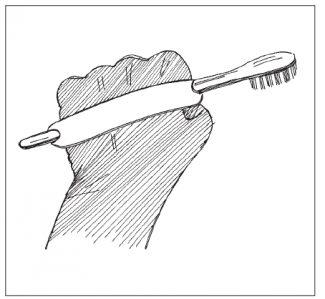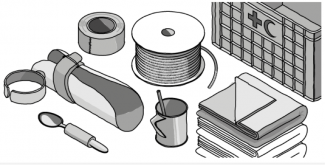Non-food items
During relief operations and emergency response, persons with disabilities may need additional non-food items (NFI), which respond to their specific needs.
During the assessment phase, consult groups of persons with disabilities to determine what are the items they mostly need.
At least 10% of the pre-prepared NFI kits should include additional items such as:
- Additional cushions or mattresses (for positioning persons with disabilities or to avoid complications for persons that have restricted mobility, as for example bedsores or infections);
- Additional blankets and clothing to persons with disabilities who have reduced mobility to prevent heat loss;
- Pens and small note pads with a string, which can be hung around the neck for people who are deaf, hard of hearing of need to explain themselves in writing;
- Additional clothes: because of a greater frequency of washing, wear and tear resulting from use of a artificial legs or arms, prosthetic device or wheelchair;
- Gloves could be provided for wheelchair users;
- A bowl or scoop for pouring water over the body when bathing is possible;
- Special cooking utensils, smaller pots and water containers, tools;
- In addition to spoons and regular cutlery, provide straws could be very useful to ensure proper intake of food and beverages;
- Additional hygiene items are important to persons with disabilities who may faced more difficulties to access washroom: stock additional hygiene items reserved for persons with disabilities. Be aware of cultural preferences during assessments or consultation, as well as the needs of women, girls, boys and men of different ages with disabilities. Ensure that women with disabilities have access to soap, water, sanitary pads or menstruation cloths, incontinence pads and other hygiene items according to individual needs.
- Simple utensil holders or bracelets can facilitate the use of household items such as cups, spoons, pens or toothbrushes. The drawing below shows a cuff or strap used to hold a toothbrush, it can be made from a simple strip of recycled rubber inner tube. This can be adapted to other simple utensils;
- Backpack can assist those using crutches and wheelchairs to transport their belongings;
- Some types of artificial arms (prosthesis) for amputees are designed with attachments that can be interchangeable.


After the first phase of emergency response, make sure to consult persons with disabilities about their needs and complement necessary non-food items. Consultations can be done through organising focus group discussion, gathering persons with disabilities, making sure that women and girls are also represented, perhaps in separate discussion. Pay attention to include persons with psychosocial disabilities or with learning disabilities who also tend to be under represented during these phases of consultation, again it may be beneficial to hold separate meetings.